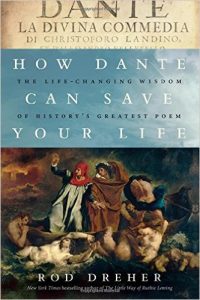 Rod Dreher’s latest book is a mix of self-help advice, autobiography, and literary exposition. It sounds odd. It is odd. But it works wonderfully.
Rod Dreher’s latest book is a mix of self-help advice, autobiography, and literary exposition. It sounds odd. It is odd. But it works wonderfully.
From a self-help perspective, which is in many ways the main thrust of the book, Dreher’s goal is to share the good news—not (necessarily) the good news as traditionally viewed, that of Christ, but the good news that Dante can, as the title says, save your life. Dreher wants to help others. The book is, fundamentally, an act of charity. He accomplishes this in two ways. First, he divides the book overtly into what can only be called lessons, drawn from Dante, each even with summarized direct self-help advice. Second, and less obviously, he invites the reader to think more deeply along these lines by reading Dante himself, with the promise that will be of even more use.
From an autobiography perspective, the book is essentially a continuation of Dreher’s “The Little Way Of Ruthie Leming,” in which Dreher first discussed his relationship with his family—primarily with his father and deceased sister. “How Dante” uses Dreher’s evolution in understanding these relationships (and in understanding himself) to help the reader understand how Dante helped him, and thus to illustrate how Dante can help the reader. Those who criticize Dreher for talking about himself miss the point. Talking about himself is the point—it’s also an act of charity. Every member of his family appears flawed in this book, including Dreher, and it hardly seem like an act of ego to use his own life in this way (although I am pretty sure I would not be happy if I were the other members of his family).
From a literary exposition perspective, Dreher’s book helps the reader dip his toe into Dante. To the average modern, me included, Dante has a daunting reputation. A book of 700-year-old Italian poetry, filled not only with complex theological symbolism but revolving frequently around long-dead and long-forgotten persons and personalities? To most people, it seems like a chore. Dreher does not claim to have discovered anything new in Dante, though he does a great job of showing the power of Dante’s words, with many cogent examples. Rather, he (again, as an act of charity) is saying that he discovered Dante accidentally and became a changed man—and that the reader is likely to be changed as well, if he follows the same path. And, perhaps most importantly, any reader can follow Dante, if necessary with one of the many secondary and analytical sources available (which Dreher lists in the bibliography).
It helps (but is not at all necessary to appreciate) to view the book through Dreher’s own personal constant focus on community, and on the restoration of moral and civic values, in the modern world. This theme appears repeatedly in this book, but on his blog and in what he promises is an upcoming book on the “Benedict Option,” it is a particular focus. He emphasizes that what Bonhoeffer called “cheap grace” solves nothing—that hard work, dedication and sacrifice are necessary to any goal, whether a personal or a global goal. “This is a truth that many modern people like me find inconvenient. We want the benefits of community, but without giving up individuality and mobility. We want the benefits of religion, but without having to submit to its disciplines. We want traditions, but only the ones we like. This doesn’t work.” Truer words were never spoken.
On a side note, a major character in the book is Dreher’s priest (Orthodox), a former policeman named Matthew Harrington. Just this month (July 2015) his wife delivered a baby with significant health issues; they are financially struggling. Dreher has been asking people to contribute—I did so, and encourage other people to show their appreciation for Dreher’s work by contributing at the Go Fund Me page for Anna Harrington (zpzk2t8) (as well as simply to perform your own work of charity!).
Perhaps the best summation of the book are words of Charles Wesley that Dreher quotes: “Catch on fire with enthusiasm and people will come for miles to watch you burn.” Dreher’s enthusiasm is contagious, and while he carefully avoids preaching, his example to others is likely to sway many unsure and wavering people towards the path he follows.
